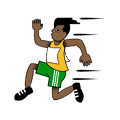Sometimes, we add another letter to spell the long /ē/
sound.
For example:

Double the e to spell the long /ē/ sound in the middle of a word.
Some examples:

Use ea to spell the long /ē/ sound.
Some examples:

This is a split digraph: the e in the middle of the word and the e at the end of the word work together to make a long /ē/ sound.
Some examples:

Use y to spell the long /ē/ sound at the end of a word. This sometimes sounds more like a soft /ɪ/.
Some examples:
The -y pattern is also used as a suffix (e.g. dust + y, sleep + y). More on this in Unit 9.
Notes:
1) Words marked * are homophones. See page 12.
2) Some words use ie to spell the long /ē/
sound, eg. chief, believe.
These ie words are in Unit 21.
You have not completed Learn the Words activities for each word list on this page.

Go to next page:
Take a test in spelling the long /ē/
sound.
The Spellzone interactive course is intended to be used online and may not be printed.
"Thank goodness for Spellzone during this remote learning phase. The site is easy for students to navigate independently and they're really enjoying the activities and spelling games. You get an awful lot for your money with Spellzone. Really reassuring is the very prompt response with helpdesk queries. I've very rarely needed the helpdesk, but when I have, the issue has been addressed and sorted within a very short time."
Sarah Taggart, Oasis Academy Lord's Hill